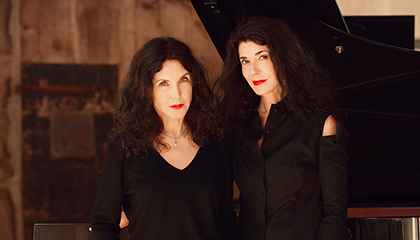To the refined and electrifying pleasure of the question-and-answer game between two pianos, a favourite exercise of Mozart's, this programme adds two classical gems: the symphony containing one of the longest themes ever written by Haydn, and the prodigious condensed drama offered by Kraus in his most famous page.
As much as Katia and Marielle Labèque are among the most attentive musicians to contemporary creation, it is to Mozart that they have chosen to return for this new invitation from the Dijon Opera and this privileged collaboration with Il Giardino Armonico. Originally composed for three keyboards, at the request of the Countess Lodron who wanted to play it with her two daughters, the Concerto No. 7 was adapted by the composer himself for two pianos. The climate of elegant elation, darkened by nostalgia in the Adagio, unfolds in the subtle dialogue between the two soloists, which is amplified and made more complex in Concerto No. 10. Brilliant, supported by a denser orchestration, this score embodies the Mozartian manner, just as Symphony No. 43, "Mercury", catalyses all of Haydn's art. In four movements, this "chamber" symphony delivers treasures of melodic imagination and rhythmic mastery, not without sparing the composer's own surprise effects. A rare concert piece, Joseph Martin Kraus's "Olympia" Overture, composed for Voltaire's piece of the same name, reveals all the genius and "Sturm und Drang" fever of this exact contemporary of Mozart.
Types
- Music
- Music
- Classical music
- Concert

